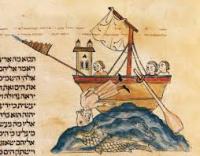
Unlike the other books of the prophets, the one named after its central character Jonah is a narrative rather than an account of prophecies. He came from the a village called Gathepher in Northern Kingdom of Israel (2 Kings 14:25) and lived during the reign of Jeroboam (786-746 BC). His journeys must have been quite extensive as he was making for Tarshish, which is in modern Spain, and when he eventually obeyed God, he would have travelled to what is now Iraq. Nineveh was a great Assyrian city; it was destroyed in 612 by the Baylonians and Medes. It was excavated in the nineteenth century and exciting discoveries were made.
The Book of Jonah is really a parable and cannot be taken literally. Even if the fish, possibly a shark, had swallowed Jonah, he could not have survived for three days. However the story is meant to illustrate God’s all-embracing love and mercy which extended to the gentiles. The reading is used for the important Jewish feast of Yom Kippur, the Day of Atonement.
Jonah is a colourful personality. God’s command does not suit him and he goes in the opposite direction. When, after his sojourn in the fish, he does go to Nineveh and prophesies its destruction, he is very annoyed that God shows mercy. He does not think of the people there, young and old, just that wickedness deserves severe punishment. Human societies are very prone to attribute blame and see “justice done”. Institutions are pilloried when fault is found with them, without any thought of the human beings who belong to them. The God who forgave Nineveh is different. He was portrayed by Jesus as the father of the prodigal son. He is not an avenging thunder-god like Zeus but one who uses all kind of means, including a big fish, to bring his children back to him.
Unlike Jonah, the disciples in today’s gospel answered Jesus’ call immediately. However they were quite capable of seeking revenge, when a Samaritan village refused to receive them. The sons of Zebedee asked Jesus if they should call fire down from Heaven to consume it (Luke 9:54-55). They, like Jonah, had a long journey to travel.
Jesus used the story to compare the repentance of the men of Nineveh with the recalcitrance of his own people (Mtt 12:41-42). He also used the prophet’s three days in the belly of the sea-monster as a symbol of his own time in the sepulchre (Mtt 12:40).